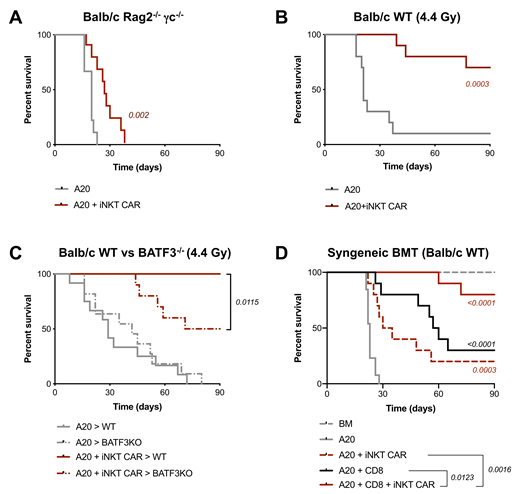An obstacle with continued clinical development of CAR T cells is the limited understanding of their biology and mechanisms of anti-tumor immunity. We and others have shown that CARs with a CD28 co-stimulatory domain drive high levels of T cell activation that also lead to exhaustion and shortened persistence. The CD28 domain includes 3 intracellular subdomains (YMNM, PRRP, and PYAP) that regulate signaling pathways post TCR-stimulation, but it is unknown how they modulate activation and/or exhaustion of CAR T cells. A detailed understanding of the mechanism of CD28-dependent exhaustion in CAR T cells will allow the design of a CAR less prone to exhaustion and reduce relapse rates. This led us to hypothesize that by incorporating null mutations of CD28 subdomains (Fig 1A) we could optimize CAR T cell signaling and reduce exhaustion.
In vitro, we found mutated CAR T cells with only a functional PYAP (mut06) subdomain secrete significantly less IFNγ, IL6, and TNFα after 24hr stimulation compared to non-mutated CD28 CAR T cells, but greater than the 1st generation m19z CAR. Also, cytotoxicity was enhanced compared to non-mutated CARs (Fig 1B). Using a pre-clinical immunocompetent mouse tumor model, we found the mut06 CAR T cell treated mice had a significant survival advantage compared to non-mutated CD28 CAR T cells (Fig 1C). To examine exhaustion, we ex vivo stimulated CAR T cells with target cells expressing CD19 and PDL1 and found mut06 CAR T cells had increased IFNγ (42%), TNFα (62%) and IL2 (73%) secretion compared to exhausted non-mutated CD28 CAR T cells. This suggests that mut06 CAR T cells are more resistant to exhaustion. To find a mechanistic explanation for this observation we examined CAR T cell signaling. After 24hr stimulation with CD19 target cells mut06 CAR T cells had a significant reduction in pAkt compared to m1928z CAR T cells, which is a critical signaling mediator in the NFAT and NR4A1 transcription factor pathways. Additionally, mut06 had decreased p-NFAT compared to m1928z when examined by western blot. To determine how optimized CAR signaling affected T cell exhaustion we looked at 22 genes that are upregulated when NFAT is constitutively active and overlap with genes identified as important for T cell exhaustion. We found that most of the exhaustion related genes were upregulated in m1928z CAR T cells while they were decreased in m19hBBz. The mut06 CAR T cell gene expression pattern was more similar to m19hBBz with exhaustion related genes downregulated compared to m1928z (Fig 1D). To examine differences in the accessibility of exhaustion related genes we performed ATAC-seq and found NFAT (Nfatc1) and NR4A2 (Nr4a2) had lower chromatin accessibility profiles in mut06 compared to m1928z (Fig 1E). We also found that exhaustion related genes Havcr2 (TIM3), Pdcd1 (PD1), and Lag3 (LAG3) all had greatly reduced chromatin accessibility in mut06 CAR T cells compared m1928z. Overall, these genomic studies support our findings that mut06 optimizes CAR T cell signaling by lowering transcription factors that regulate exhaustion.
Li:ImmuneBro Therapeutics: Other: sole shareholder . Davila:Atara: Research Funding; Celgene: Research Funding; GlaxoSmithKline: Consultancy; Novartis: Research Funding; Anixa: Consultancy; Bellicum: Consultancy; Adaptive: Consultancy; Precision Biosciences: Consultancy.
Author notes
Asterisk with author names denotes non-ASH members.


This feature is available to Subscribers Only
Sign In or Create an Account Close Modal